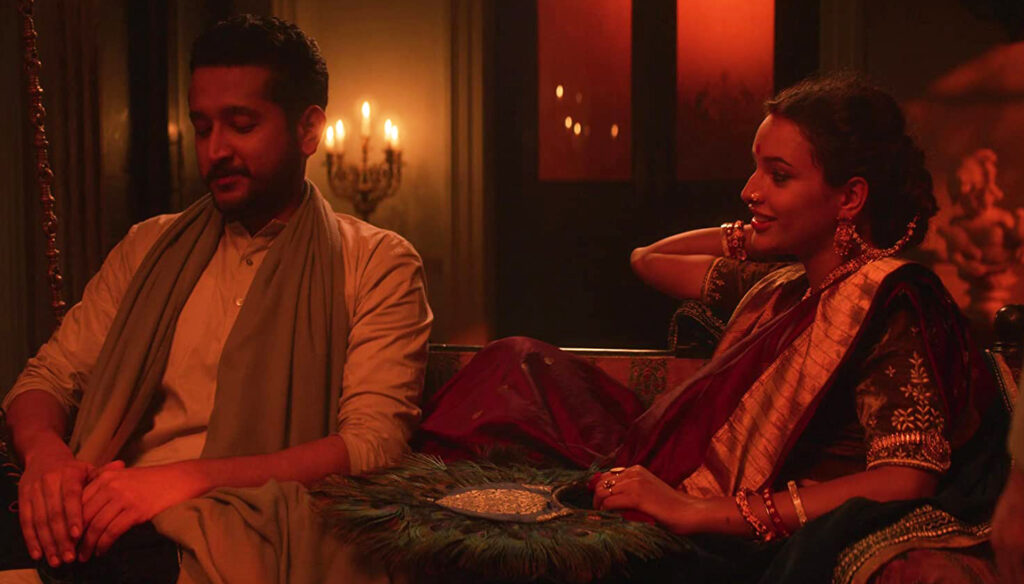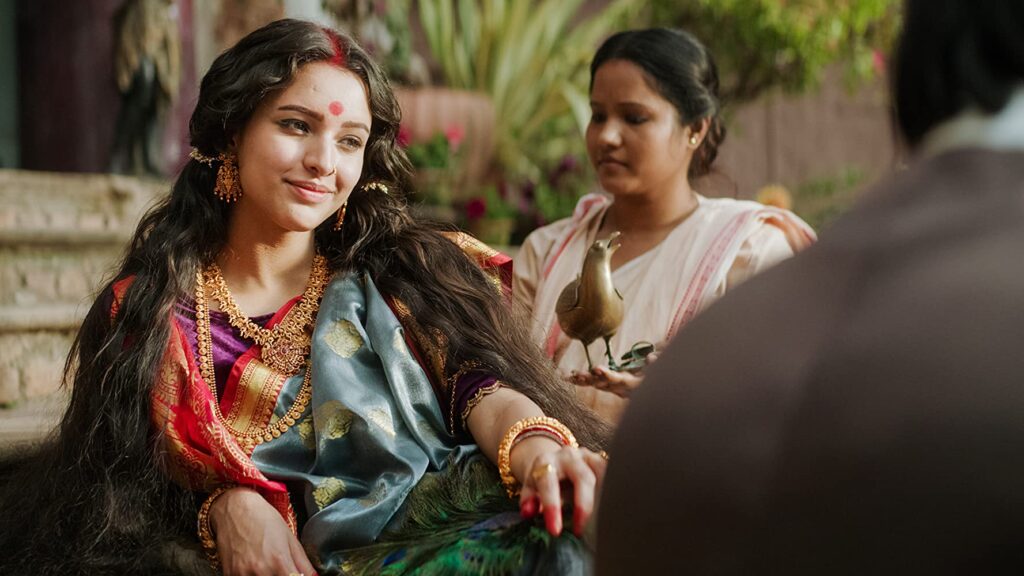“Bulbbul” is a ‘horror movie’ in the same way that “Pan’s Labrynth” is a ‘horror movie;’ as in the focus of both movies are the horrific acts and toxic rituals society has been partaking in for centuries and which have set it back for centuries.
“Bulbbul” opens on a marriage ceremony in 1880s Bengal. A child marriage ceremony. Now if that doesn’t send chills down your spine in itself, I don’t know what will. Bulbbul, who is just a wee child, is being married off to Indranil, a much older man who owns a large mansion. We are also introduced to his mentally ill twin brother who is nothing but a gross and creepy pedophile towards his young sister-in-law (his behaviour makes me reach for the doggy bag, but I’ll reserve it for later for the more cringe-inducing moments built on patriarchial ‘customs’ that are yet to come) and her other brother-in-law Satya who will grow up to be the typical ‘nice toxic boy’ mothers should be warning their kids about.
For 20 or so years, Bulbbul grows up in this male dominated household under the jealous eye of her husband, and is restricted to being the cardboard cutout obedient wife and spectator. This is just like her older sister-in-law Binodini, who is relegated to the same age-old gender norms…until certain circumstances make the her realize her worth and she undergoes a sudden change. There are also a string of horrific, mysterious murders that occur in the nearby forest and locality which may or may not be tied in to the changes that innocent Bulbbul undergoes during her coming-of-age.
The writing by Anvita Dutt is applause-worthy, and I love the contrasting personalities of each character. One such contrast is between Bulbbul and Satya, who both undergo character growth, albeit in opposite directions, with Satya growing up from nice and protective towards Bulbbul during their childhood to overly protective and suffocatingly toxic towards her in adulthood. Bulbbul, on the other hand, ditches her meekness for something stronger. Another contrast seen here is between her and Binodini, who has let patriarchy take its course and is even a servant to the societal norms set for her, dependent on the men in her life for jewels and silk and what not. Bulbbul, despite her youthful, innocent, childlike nature seems more determined to break out from that same mould, determined to even run the house on her own, long after the departure of the ‘man of the house’ to whom she was married off to as a child.

Tripti Dimri is a talented actress to look out for. She breezes through her role as Bulbbul like a seasoned veteran, biting into it juicily and commanding the viewer’s attention merely with her body language and range of emotions. Rahul Bose scares the bejesus out of me whenever he’s onscreen either as ‘Indranil the jealous’ or his twin brother, Mahendra (AKA the pedo creep). Lending Tripti Dimri ample support as Satya is her co-star from the critically acclaimed “Laila Majnu,” Avinash Tiwary, who is always a delight to watch, especially in intense scenes and he’s another young talent who hopefully gets more recognition. Parambrata Chaterjee and Paoli Dam as Dr. Sudip (the family doctor) and Binodini respectively are top notch as usual.
The colour palette, mostly the reds (reminiscent of the sindoor/vermilion red colour used to fill in a bride’s hair parting on her wedding day) that are used in the scenes set in the forest eerily gave me “Crimson Peak” vibes (another period piece with strong feminist themes as well) and the soundtrack is as haunting as the storyline. A highly emotional and intense scene that will forever stay with me—partly due to the music and partly due to the acting—is one that takes place earlier in the movie when Bulbbul is weeping in front of a roaring fireplace while flames lap up the remnants of a notebook left behind by Satya, with the weeping violin strings perfectly complementing her heart wrenching wails.
There is some powerful imagery associated here with the theme of patriarchy, one of which is the bars of the window which Bulbbul often wistfully looks out from and which I felt aptly summed up her sense of imprisonment in a household where the men always wanted to yield power over her.
This is a bold movie that isn’t preachy about its message and shows more than it tells, and this is just one of its many strengths. Special mention to the cinematography, especially for some scenes which subtly use high angle shots to demonstrate the superiority of men over women in the first half of Bulbbul’s journey. The CGI during the paranormal sequences is good and I always love it when movies don’t overuse it.
Caution: Some scenes might be graphically violent, squeamish, and cruel in nature, but then again, so is subjecting women to age-old patriarchal ideas.


